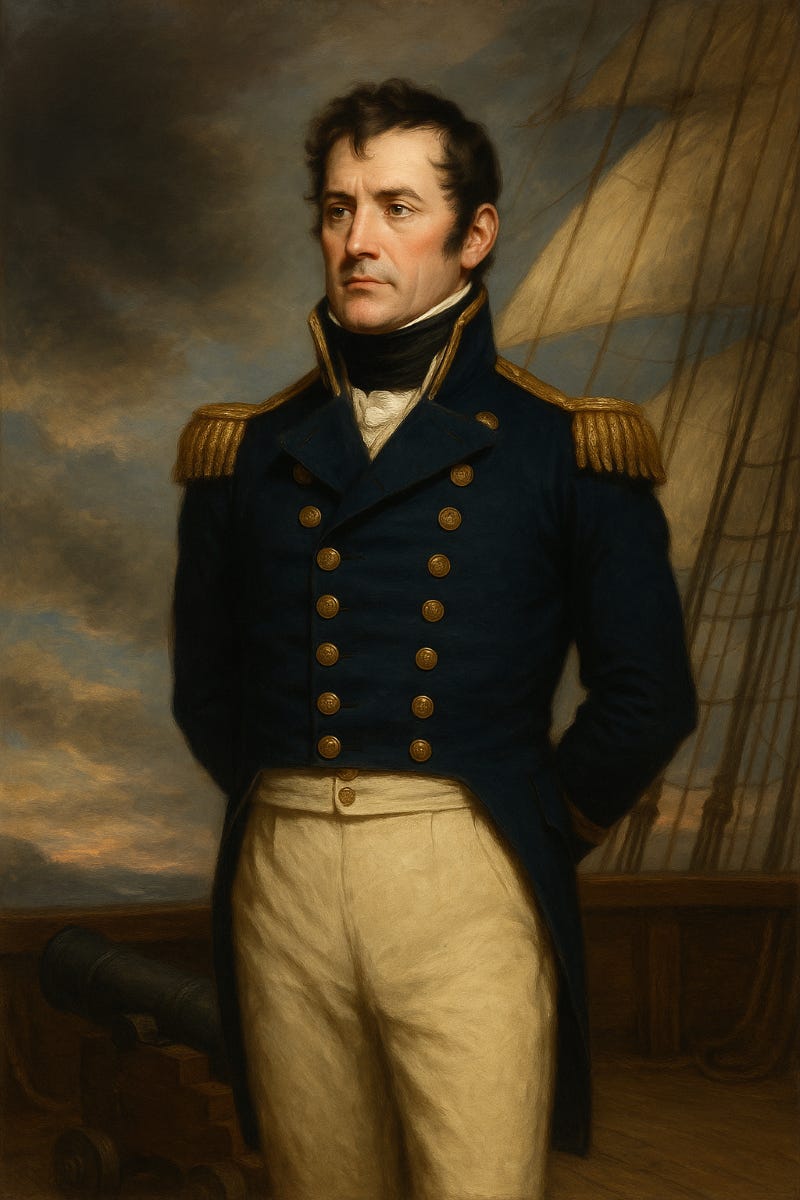OPEN LETTER TO THE READER
ON EDUCATION AND ITS IMPORTANCE TO EVERY GENERATION
Sir or Madam,
Permit me a moment to speak not as a commodore of the United States Navy, but as a man who has spent his life in the service of a republic still in its youth, a republic that will rise or fall on the character of those entrusted to command its future.
When young Mr. Pyle regained consciousness, wounded but not defeated, I saw in him the makings of such a man. To heal the body, rest and time must do their work. But to prepare the mind for the burdens of command? That requires something more enduring.
And so, I placed in his sea chest, not orders, nor medals, nor a promotion, but a collection of books. Each chosen with purpose.
I offer you now the same reflection I offered him. For whether you are at sea or ashore, young or old, of my time or yours, the lessons within these volumes are meant to equip you for a life of meaning, principle, and duty.
The American Practical Navigator by Nathaniel Bowditch
The sailor’s Bible.
This book saves lives. It teaches that the sea does not forgive error, but rewards precision. Every young officer must learn to navigate, literally and figuratively, with clarity, confidence, and care.
Elements by Euclid
Where reasoning begins.
Euclid trains the mind in logical structure. Geometry is not only for engineers—it disciplines the mind to prove what is true, and to separate conjecture from fact.
Arithmetica by Diophantus
Puzzles for the patient mind.
Some problems yield no immediate answer. Diophantus reminds us that persistence in problem-solving is a virtue. Not all battles are won with cannon.
Principia Mathematica by Isaac Newton
The laws that govern heaven and earth.
Newton teaches us that force without understanding is folly. When you understand how the world moves, you may learn how to move wisely within it.
The Iliad & The Odyssey by Homer
War and home.
The Iliad shows the cost of pride and the rage of warriors. The Odyssey shows the price of return and the endurance of the soul. Read them both, and you begin to understand the arc of a life tested by conflict. Every generation is tested by conflict. Be prepared for yours.
The Aeneid by Virgil
The burden of founding something greater than oneself.
Aeneas fights not for vengeance, but for legacy. In him, we find the model of the leader who sacrifices glory to build something enduring.
The Republic by Plato
What is justice?
If you would hold power, you must understand its temptations. Plato demands that you ask what makes a society just, and whether you are strong enough to defend that answer when others are not.
The Divine Comedy by Dante Alighieri
Sin, penance, and grace.
Dante walks through Hell, Purgatory, and Paradise not for entertainment, but for revelation. This is the inner voyage of every man who must lead others while reckoning with his own failings.
The Canterbury Tales by Geoffrey Chaucer
A study of men in all their variety.
You will lead no perfect crew. Chaucer reminds us that every man brings his own story, his own flaw, and his own moment of unexpected grace. To command is first to understand.
The Prince by Niccolò Machiavelli
A mirror, not a manual.
Machiavelli is not to be followed, but recognized. Those who play the game of power without scruple will be your rivals. You must know their strategies, but never trade your honor for their tools.
Paradise Lost by John Milton
Obedience, rebellion, and the weight of free will.
Milton’s Satan is a warning to all who confuse defiance with freedom. Read this, and remember: true strength lies not in resisting orders, but in discerning whether those orders serve what is right.
Pilgrim’s Progress by John Bunyan
A long, hard road toward the good.
You will falter. You will doubt. Bunyan prepares you to continue anyway. In war, in command, in faith, perseverance is not a comfort. It is a calling.
Robinson Crusoe by Daniel Defoe
A man alone learns who he truly is.
Crusoe survives by turning isolation into invention. He learns that solitude need not be ruin, but refinement. Every officer must be ready to lead even when no one is watching.
These are not dusty volumes for idle hours. They are weapons of the mind, fitted not for the parlor, but for the quarterdeck, the battlefield, the courtroom, and the voting hall.
If you have read this far, then I ask you to go a little further. Choose one. Read it. Then ask yourself: what kind of life am I building? What kind of world am I building?
Whether aboard ship or in the republic beyond the shore, someone will one day look to you for direction.
Be ready.
John Rodgers, Commodore, United States Navy





